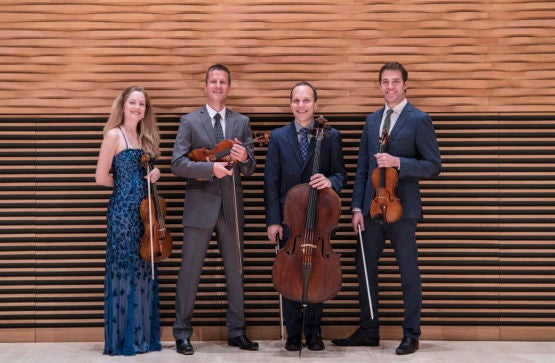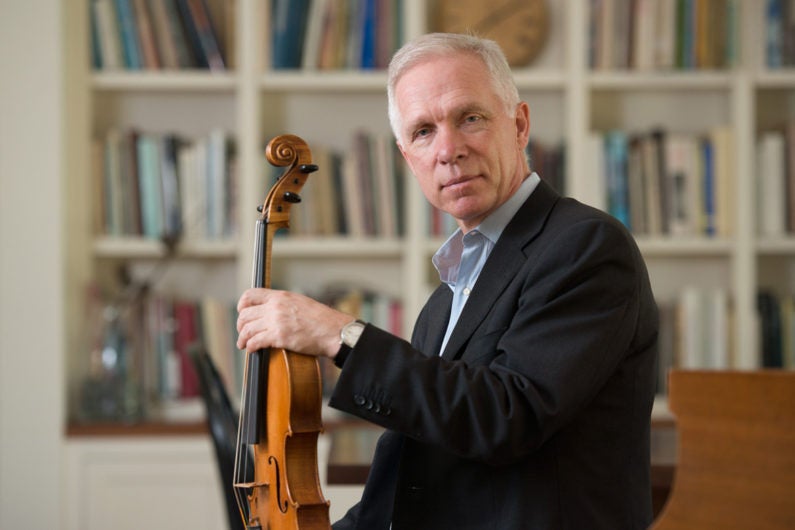Stanford launches its first free online course in classical music appreciation
Led by Stanford Professor Stephen Hinton, a new online class features the composer Haydn and performances by the St. Lawrence String Quartet. It is filmed in the Bing Concert Hall and the Bing Studio.

Members of the St. Lawrence String Quartet: Lesley Robertson, Geoff Nuttall, Christopher Costanza and Owen Dalby (Image credit: Eric Cheng)
A new, free Stanford Online class that explores the early evolution of the string quartet and features classical music and commentary is now open for enrollment.
Designed to be of interest both to musicians and those with no prior knowledge of the form, Defining the String Quartet: Haydn explores the origins of the string quartet through the lens of its first great exponent, Joseph Haydn.
The self-paced course, which began on May 17, was co-developed by Stephen Hinton, Avalon Foundation Professor in the Humanities and professor of music history at Stanford, and the members of the renowned St. Lawrence String Quartet, the university’s ensemble-in-residence. The latter recorded numerous pieces illustrating Hinton’s commentary in the Bing Concert Hall and Studio specifically for the class.
The course is divided into six lessons that cover two main areas of study, said Hinton, an expert in German classical music.
“In the first part we trace the origins of the medium, which go back to the 17th and early 18th century,” he said. “In the second, we zero in on the history-shaping contributions of Haydn, the acknowledged ‘father of the string quartet.’”

Stephen Hinton (Image credit: L.A. Cicero)
“Haydn’s compositions for the medium of the string quartet helped to establish it as a genre in its own right,” Hinton noted. “They define the formal conventions and aesthetic values that have secured the string quartet a special significance in Western musical culture.”
They also have a special place in the St. Lawrence String Quartet’s repertoire, as the chamber group plays more works by Haydn than any other composer. Each of the quartet’s players is also a faculty member in Stanford’s Department of Music, teaching students with a diverse range of backgrounds and interests via seminars, master classes and interdisciplinary collaborations.
The new online course grew out of a prior Stanford class, Quartet Conversations, that Hinton and the quartet created for Stanford Continuing Studies students, as well as a freshman seminar, The Classical String Quartet, which they co-taught.
Teaching online, however, is a new experience for both professor and musicians.
“It’s utterly different from teaching in a classroom,” Hinton said. “It involves a large team of people and extensive coordination. The whole thing has taken the best part of a year to do.”
But the result also offers some distinct advantages for music appreciation. “The modular approach will make it possible for participants to focus on different parts of the course, to go at their own pace, and to review the materials at their own leisure as little or as often as they like,” Hinton said.
Adding to the experience is new technology, developed by Craig Sapp at Stanford’s Center for Computer Assisted Research in the Humanities, offering dynamic musical notation that lights up as it plays, allowing for richer comprehension. The course also features quizzes and exercises, developed by Stanford musicology doctoral student Victoria Chang, which test comprehension and knowledge as participants advance through the sequence of lessons.
Enrollees who successfully complete the full course can receive a statement of accomplishment that reflects their level of participation and achievement. This will be marked as “entry-level” or “advanced.”
